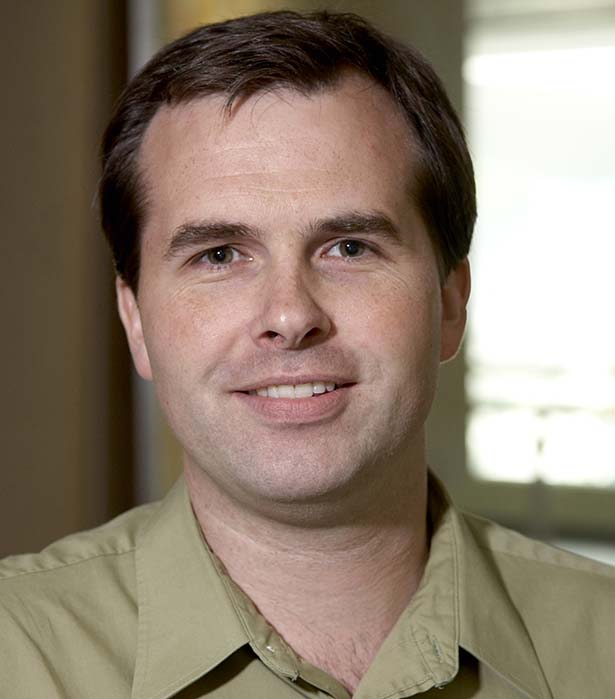Targeting drugs from nature earns researcher ‘Innovator of the Year’ title

Nathan Magarvey, a member of the Michael G. DeGroote Institute for Infectious Disease Research (IIDR) and assistant professor in the Departments of Biochemistry and Biomedical Sciences and Chemistry & Chemical Biology, was named McMaster’s Innovator of the Year at the recent Innovation Showcase.
By integrating tools and technologies – from genomics to small molecules – to target drugs from nature, investigator Nathan Magarvey is helping build a culture of innovation at McMaster University.
As a result, Magarvey, a member of the Michael G. DeGroote Institute for Infectious Disease Research (IIDR) and assistant professor in the Departments of Biochemistry and Biomedical Sciences and Chemistry & Chemical Biology, has been named McMaster’s Innovator of the Year.
His award was announced at the sixth annual McMaster Innovation Showcase that featured the presentation of 13 awards, including a Synergy Award to IIDR member David Earn, a professor in the Department of Mathematics and Statistics.
“We had quite a list of nominations for this year’s Innovator Awards, which recognize those researchers who have achieved commercial success,” said Mo Elbestawi, vice-president, Research and International Affairs, at the awards’ presentation. “The awards were created to encourage a culture of innovation, commercialization and entrepreneurship within the McMaster community, and I believe they are doing just that.”
Magarvey published two high impact publications in significant journals in the last year, including a paper in Nature Chemical Biology and another in the Proceedings of the National Academy of Sciences.
His research discovered that gold resistant bacterium Delftia acidovorans can turn toxic water-soluble gold into a solid gold form, the first demonstration that the gold-resistant microbe secretes a metabolite that can protect against toxic gold.
He also described a natural product tool that assists in the identification of natural products and small molecules.
His projects have led to technologies and patent applications and connections with industry, including mining companies who are further validating the use of his discovery on the level of gold in soil samples.
Magarvey received his PhD in 2005 at the University of Minnesota after working at Wyeth-Ayerst (now Pfizer) in Infectious Diseases. Following this, he took a postdoctoral position at Harvard Medical School and studied the enzymatic mechanisms associated with bacterial small molecule toxins and natural antibacterials.
Magarvey came to McMaster in 2008 and has since received a CIHR New Investigator Award and Canada Research Chair in Natural Product Drug Discovery.
“This award is a nice appreciation of the excellent innovative works and hard efforts of my team,” Magarvey says. “It is a great feeling to be a current force of the innovative spirit that has long been a cornerstone of McMaster’s research excellence.”
David Earn’s Synergy Award highlights research achievement and interdisciplinary research excellence.
Earn develops and analyzes mathematical models of biological systems, primarily for applications in epidemiology, ecology and animal behaviour. In 2012, he published a study in the journal Annals of Internal Medicine with collaborators from across campus that investigated whether closing elementary and secondary schools can help slow the spread of infectious disease and should be considered as a control measure during pandemic outbreaks.
Using high-quality data about the incidence of influenza infections in Alberta during the 2009 H1N1 flu pandemic, he demonstrated that when schools closed for the summer, the transmission of infection from person to person was sharply reduced.
Earn also investigates strategies for conservation of endangered species and strategies for eradication of parasites that cause infectious diseases and looks at the application of game theory to the evolutionary dynamics of behavioural traits.
“We have so many stellar researchers who think beyond their office walls and laboratory space,” added Elbestawi, “who reach out beyond their own discipline and field of expertise to collaborate with colleagues here at Mac, across Canada and indeed, across the globe.”
Earn was one of three recipients of the Synergy Award. The other two were John Connolly, Professor and Sir William McMaster Chair in Cognitive Neuroscience of Language and the McMaster Community Poverty Initiative team.
For more information and to view all of the recipients visit http://www.research.mcmaster.ca/news/2013-innovation-showcase-award-winners

